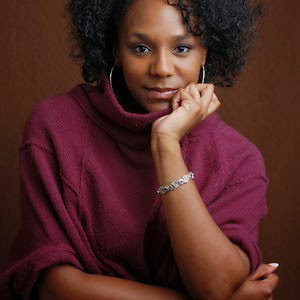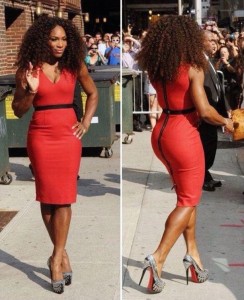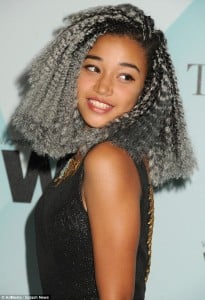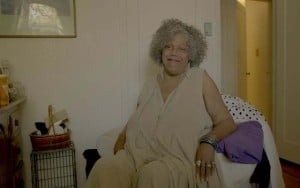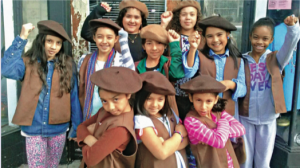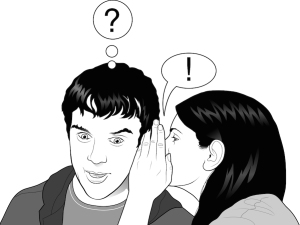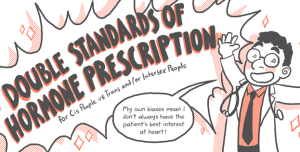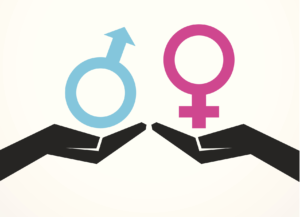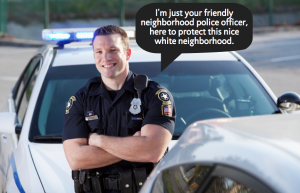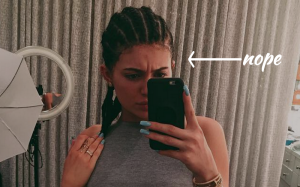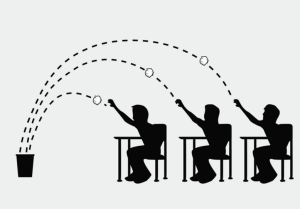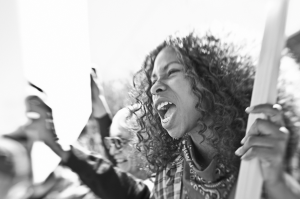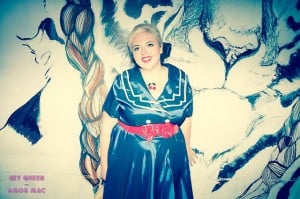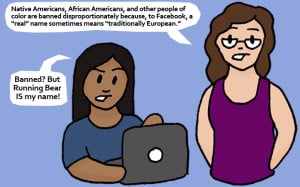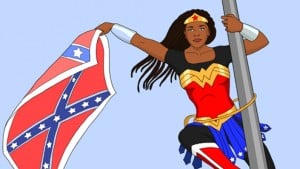
Source: Rebecca Cohen
When I think about all the Black heroes changing the world today, I’m proud to get to be alive right now.
People from my community are creating art, passing laws, and holding protests that will go down in history as some of our country’s most defining moments. Black women and girls are at the center of these moments.
We have survived generations of oppression, and we’re as radiant and resilient as ever. You know how Black don’t crack.
Don’t get me wrong – it’s also a real struggle to be a Black woman or girl in the United States these days. This year alone, we’ve mourned lives lost to police violence and white supremacist murder, watched attacks against Dejerria Becton in McKinney, Texas, and against Sandra Bland, and more.
We grow up learning to navigate misogynoir – the sexist and racist hatred of Black women – and we’ve lost sisters, mothers, and friends to this hate.
So you could call our 2015 story a tragedy. But amidst all the tragedy, and sometimes directly in response to it, we’ve have had some victories, too.
And we don’t get to celebrate our victories nearly enough.
Which is outrageous, if for no other reason than that we are so damn deserving of appreciation.
We’re surviving the terror of the violence that targets us. Not to mention dealing with everyday battles to be taken seriously while we’re dehumanized and treated more as stereotypes than people.
But still – I promise our story is one of celebration. Because all of our obstacles mean that another quintessential part of the Black womanhood is the joy of survival.
We’re refusing to stay silent about our pain, using the Say Her Name movement against police violence to demand justice for murdered women and girls like Rekia Boyd, Mya Hall, and Aiyana Stanley-Jones.
We have groundbreaking 14-year-old baseball champion Mo’ne Davis, who gracefully rose above the racist and sexist insults hurled into her moment in the spotlight, and who just won her latest accolade, an ESPY award. And Kyemah McEntyre, a bullied high school senior who designed her own Afrocentric prom dress, slayed ALL up and down the internet as she wore it, and went home as prom queen.
All the Black girl heroes who have done big things this year remind me that, in spite of the reasons to get discouraged as a Black girl in this society, we’ve all got some joy to look forward to.
So here are some lessons of hope for what’s in store for you in this lifetime.
1. From Bree Newsome: You Don’t Have to Ask Permission For Your Freedom
“I did it because I am free.” —Bree Newsome
Black. Women. Get. Shit. Done.
Just look at Bree Newsome, the fearless freedom fighter who climbed the flagpole at the South Carolina statehouse and took down the racist Confederate flag that never should’ve been up there in the first place.
She broke so fiercely from the status quo. As she told the officers who took her into custody, she was prepared to be arrested – because, of course, nobody’s supposed to break the law.
But according to society’s norms, Black women are additionally “supposed” to keep our mouths shut.
We’re expected to care for other people before ourselves. Meanwhile, we’re hurting. Reeling from tragedies like the Charleston massacre that killed six Black women among the nine who died.
And if we get mad, we’re told we’re too angry, too uppity. If we condemn injustice, we’re said to be playing the victim.
When Bree Newsome shouted “This flag comes down today!” she proved that we do the opposite of playing the victim – we take action. Even if it takes some civil disobedience.
When a fed up Black woman refuses to follow oppressive rules meant to keep her down, she lifts her whole community up with her.
So you could compare Bree to a superhero – her expression one of determination, her dreadlocks flying in the wind as she ascended the flagpole.
Except she showed that you don’t have to be a superhero to do superhero deeds – you can be a real life Black woman standing up for yourself.
What are society’s rules telling you not to do? Do you feel pressure to wear your hair a certain way? To prioritize your activism for racial or gender justice before your own needs? To say “yes” to everyone who asks for your help?
These rules hold us back from the freedom we deserve.
Whether you’re scaling a flagpole or learning to assert your boundaries with one “no” at a time, you have the power to take your freedom for yourself, without asking for permission.
2. From Serena Williams: Your Vision of Yourself Is the Truth
“If you can keep playing tennis when somebody is shooting a gun down the street, that’s concentration.” —Serena Williams
Serena Williams is arguably the best female tennis player – arguably the best female athlete – of all time. Yes, this calls for a quote from Kanye: of ALL TIME.
Her historic record shows persistence and mastery of her sport. As she puts it, “I’ve always been a fighter” – and she had to be, to get from tennis courts in Compton to where she is today, dominating a predominately white sport.
But like any Black woman who dares to succeed, Serena’s been under scrutiny from the start of her twenty-year career.
For instance, after her recent US Open victory (her sixth win and third in a row), some said she has a “masculine” figure that other athletic women avoid. Black women everywhere cringed at these tired, familiar attacks on our bodies.
Because while these people think they can get away with passing that off as sports commentary, we know what’s really going on.
These are the same sexist and racist notions used to exclude us from images of “ideal” womanhood and justify violence against us for centuries.
When it comes to our beauty, sometimes it feels like we can’t win – we’re either called “ugly” or we’re fetishized in a way that strips us of our humanity.
When was the last time you rejected these ideas to recognize your beauty?
That might be a tough question, but I bet you have an answer – every time a Black woman takes a selfie, admires her reflection, or wears an outfit that makes her feel good, she proves that white supremacy can’t invalidate her beauty.
Think of how Serena does it – she beams her dazzling smile and her radiant brown skin, with stunning outfits and a lipstick game on point. She speaks proudly about her femininity.
Let that sink in: One of the most accomplished women on the planet is challenging the most popular myths about what it means to be feminine and beautiful.
She’s making everyone else realize that beauty and womanhood don’t just belong to delicate white women.
Black women and girls deserve to adore ourselves, no matter what anyone says about our beauty. We deserve to believe in ourselves, no matter what anyone says about our capabilities.
Even when you feel like your love is the only love you’ve got – you are a beautiful and powerful being, so your love is a beautifully powerful thing.
3. From Amandla Stenberg: Nobody Can Jack Your Style – Which Doesn’t Mean You’re Too Angry
“What would America be like if we loved Black people as much as we love Black culture?” —Amandla Stenberg
I’m going on record co-signing everything Amandla Stenberg has said about cultural appropriation, because the 16-year-old Hunger Games actress has said it all.
She nailed the real problem – the media’s pesky and oppressive habit of making Black women invisible while putting the spotlight on white women who take their style.
Over and over again, we’ve had white celebrities gain fame, profit, and credit with hair, music, dance, and clothing styles they’ve stolen from us – implying that our features are only attractive on white women.
And now that Amandla has critiqued Kylie Jenner, the media is doing what they so often do and portraying her as an angry Black girl savagely striking out at a fragile white girl.
But Amandla’s also standing up for herself, asserting her right to express strong opinions without being labeled an Angry Black Girl.
With people trying to erase our culture, Black women and girls can use all the self-preservation tools we can get, and Amandla’s voice is mighty.
Cultural appropriation may not seem to some people like a big deal – as many people said during the Kylie Jenner debacle, “it’s just hair.” But appropriation has a real impact on our lives, and it shows how white people can feel entitled to take from us when it benefits them and discard the rest.
That’s exploitation, and it’s not cool.
And you’re not being oversensitive or excessively angry if you speak up against microaggressions like cultural appropriation.
People may try to take your culture, but they can’t take your voice, and it’s your right to refuse to let them.
4. From Miss Major Griffin-Gracy: Fighting for Yourself Is Revolutionary
“I want all of us to at least have an opportunity to make it to seventy. And when the dust settles, I want my girls to stand up and let people know we’re still fucking here.” —Miss Major
Miss Major Griffin-Gracy is a living legend.
There’s no other word for a veteran of the Stonewall Rebellion, executive director of Transgender GenderVariant Intersex Justice Project (TGIJP), and “Mama” to her community.
Simply put, we wouldn’t have our current LGBTQIA+ movement or the resources so many trans people rely on today if it wasn’t for Miss Major.
And yet, Miss Major’s story is also one of exclusion and erasure, including the rejection of trans women of color from the first LGBTQIA+ liberation protests.
The mainstream movement still overlooks trans women of color, focusing primarily on white, cisgender men. An upcoming major motion picture called Stonewall – which leaves out Miss Major and other people of color who played significant roles on that pivotal night – is just the latest example of this.
It was trans women of color who had “very little to lose” and everything to fight for when Marsha P. Johnson threw the first punch to spark the Stonewall Rebellion widely credited with kicking off the queer and trans liberation movement.
Unfortunately, trans women of color still have to fight to survive, facing structural violence like a lack of housing and employment, and constant criminalization.
And with 17 trans women we know of already murdered this year, 2015 has been the deadliest year ever recorded for trans women.
Most of the victims are people of color, primarily Black trans women, including India Clarke, Amber Monroe, and Shade Schuler.
In this devastating crisis, it’s outrageous that the dominant voices of the LGBTQIA+ movement still refuse to recognize the vital work of trans women of color like Miss Major.
So what can we do in the face of systematic violence and stories that write us out of history?
Miss Major advocates for trans women of color previously and currently incarcerated, as well as sex workers and other folks marginalized even by those who claim to believe in equality.
Her solutions aren’t just band-aids, or solutions that only benefit the most privileged in the community. They’re ways to completely transform cultural norms that most of us don’t even think twice about.
The same norms that Black cisgender women, trans women, and gender non-conforming people challenge with every stereotype-defying act of our lives.
When the system’s not providing the support we need, we can follow Miss Major’s lead and dismantle the whole damn thing.
For instance, many of us can’t rely on the police to keep us safe, or on mental health providers to give the support we need. But we wouldn’t have made it this far without our own wise intuition to keep ourselves safe, or the coping strategies that help us heal from trauma.
So while we organize against unjust systems, let’s also continue building our power to survive without them.
Learn about how to care of yourself and others in violent situations, and how to nurture your mental wellness.
I have a feeling you’ll find that your wise intuition already has you on the right track. Fighting for you is what it’s there for. Keep listening to what you already know.
5. From Riley Curry: Your Freedom Beats Respectability Any Day
“I wanna sit right here!” —Riley Curry
Riley Curry’s the real MVP.
Apparently her dad’s a big deal too or something, but this year, the NBA Finals were just the commercials between segments of The Riley Curry Show. Riley’s proud papa is hard to steal a spotlight from – he’s Stephen Curry, the NBA MVP who led the Golden State Warriors to win the 2015 championship.
But at only three years old (she just celebrated her birthday with an adorable “whip” and “nae nae”), Riley has commanded attention – as toddlers tend to do – and earned her own following.
When she insisted on joining her father in post-game interviews to make the set her playground and sing Big Sean’s “Blessed” into the microphone, she was unapologetically joyful. And she and her father showed unapologetic Black family love. Even after taking criticism for the “distraction” of a two-year-old acting like a two-year-old instead of bowing to respectability politics.
Childhood is a time of wonder, imagination, and curiosity. But Black girls face real consequences if we dare to be carefree.
Out of love and protection, our families condition us to restrain ourselves. The school-to-prison pipeline criminalizes our children and puts them on the path to incarceration from a young age.
If we don’t “behave” the way society expects us to, we can end up harassed, abused, or killed.
So it’s easy to forget the wondrous possibilities of being a carefree Black girl. In the arms of her father, Riley felt safe, and she expressed herself freely without a single care for what the world thought of her self-expression.
She reminds me of how important it is to find—no, insist on—a safe space for me.
And of how I can boldly claim that space, freely express myself, and take a moment on the microphone to tell the world I feel blessed.
What does it take for you to feel free? Give yourself some time with the place, person, or activity that lets you be your authentic self, even if it means getting one small moment of joy at a time.
6. From the Radical Monarchs: Allyship Can Be Adorable
“When trans women are under attack, what do we do? Fight back! Fight back!” —The Radical Monarchs
This is not a drill: We live in a world where the Radical Monarchs are a thing. It’s time to celebrate, y’all.
Formerly the Radical Brownies, the Radial Monarchs are an Oakland-based, social justice-focused program for young girls of color. They are not affiliated with the Girl Scouts of the USA.
They wear brown berets in homage to activist groups the Blank Panthers and the Brown Berets and earn badges for revolutionary acts in areas like “Radical Beauty” and “Black Lives Matter.”
I hope they’re also learning life-saving strategies, because my Black feminist heart can’t even handle this radical cuteness and I might need somebody to revive me.
The Radical Monarchs recently made a powerful show of solidarity with the San Francisco organization El/La Para Translatinas at the 12th Annual Trans March.
Their lively chants and colorful signs included “This is what allyship looks like” and “Hey hey, ho ho, transphobia has got to go!”
If this is what allyship looks like, then we’re all in for a good time.
These girls may be young, but they already have a crucial lesson to share about how intersectional solidarity builds the collective power of our movements.
They’ve got three of the most important steps of being an ally down:
1. Listening to the community you’re supporting, to learn from them about the issues affecting their lives.
2. Bringing visibility to the movement, so others can pay attention, too.
3. Showing up – making a loud and clear statement that you stand with this community. And taking action to back up your words.
Bonus points for breaking barriers and shattering false stereotypes while you’re at it.
People underestimate girls of color all the time, but the Radical Monarchs prove them wrong with their inspiring power to create change.
When we stand up for each other, we find hope for the future, connections with others, and opportunities to share some laughs. Every Black girl could use some of that.
7. From You: Your Life Is a Victory
How does it feel to be among such greatness?
I know that by reading this article, you’re not actually in the presence of these Black girl heroes. Though if you’re anything like me, you’re really wishing you could hang with Amandla Stenberg and the Radical Monarchs right about now.
But you are in the presence of you. And as a Black woman or girl who’s living in the same moment as these awe-inspiring heroes, your presence is just as special.
These heroes are just like you and me.
They’re survivors who refused to stop fighting. Champions who rose up straight outta Compton and other tough neighborhoods, overcoming near-impossible odds. Black girls who shut their haters down to demand a safe space to be carefree.
You don’t even have to be in the news to be a Black girl hero.
Every move you make to define yourself, take care of yourself, and stand up for your freedom makes the world a more liberating place for the rest of us.
In Sandra Bland’s honor, for the world the Radical Monarchs fight for, we say her name. In Bree Newsome’s footsteps, for Riley Curry’s future, we don’t ask permission for our freedom.
To be a Black woman or girl in 2015 is to end each day in victory. Here’s to you and your lifetime of victories.
[do_widget id=’text-101′]
Maisha Z. Johnson is the Digital Content Associate and Staff Writer of Everyday Feminism. You can find her writing at the intersections and shamelessly indulging in her obsession with pop culture around the web. Maisha’s past work includes Community United Against Violence (CUAV), the nation’s oldest LGBTQ anti-violence organization, and Fired Up!, a program of California Coalition for Women Prisoners. Through her own project, Inkblot Arts, Maisha taps into the creative arts and digital media to amplify the voices of those often silenced. Like her on Facebook or follow her on Twitter @mzjwords.
Search our 3000+ articles!
Read our articles about:
Our online racial justice training
Used by hundreds of universities, non-profits, and businesses.
Click to learn more


